#double entendre very relevant
Conversation
Daemon: So, dear nephew. We ought to have a _chat_, don't you think? *Drags Aemond off to _educate_ him*
------
Aemond: *Holds up Blackfyre and the Aegon the Conqueror's crown* Sister. Majesty. I bring terrible tidings.
------
Alicent: What do you mean you've found the king but lost Aemond? Should I expect you to lose my daughter next?
Criston Cole: *Looks dejected and mutters* I mean the whole city heard Vhagar leave ...
#what type of education?#well I have half a mind to write a fic where Aemond is basically throwing himself at Daemon wanting sword lessons#double entendre very relevant#he would be like 'Daemon sempai I beat up Criston this morning for you'#please _teach_ me#but honestly this is kind of what the last aemond 5+1 fic will be#just more serious#and no alicent#hotd incorrect quotes#hotd crack#daemon targaryen#aemond targaryen#should be senpai#not sempai#typing is hard#but yeah so daemond fic likly in the future#I have too many fic ideas and not enough time
58 notes
·
View notes
Text
Reanimator and Evil Dead both have such big fandoms where everyone mostly makes fun and (comparatively) lighthearted content, that I genuinely forget both of them are in the weird category of mid-80s horror movies that feature absolutely despicable and bizarre, graphic rape scenes
Like oops
#ive seen other people talking about this lately and was reminded by the disclaimer on thag fanart like Oh Yeah THAT Scene 😬#in that category is also basket case and from beyond and flesh + blood#arguably the bride too#hannah is talking#I find the scene in evil dead worse personally cuz it really happens for like zero reason. I could argue plot relevance for the reanimator#scene if I really had to. and unfortunately I find the whole visual double entendre in reanimator very funny
15 notes
·
View notes
Text
Man I wish there was an original fic site as organized and YEEHAW as AO3. All I have is like, furaffinity for public posting and there are chapters of my story I may not be able to post on there because they have direct/metaphorical references to nazis for legitimate and thought out symbolic reasons
#yeah I know that’s like the tritest type of evil#but it is VERY relevant to that story and not an element I can dispose of. At best I can just do hardcore double entendres
0 notes
Text
The art director & the Good Omens book cover tier list of doom, part 3
Part 1 l Part 2 l Part 3
I am your resident Art Director/Good Omens enthusiast, and welcome to my completely meta-free book cover tier list. Listen, making a book cover is HARD. I should know. But while we salute these artists for their hard work and time, I think we can all admit that once in a while, the vision is just not on. And on very rare occasions, publishers seemed to have managed to commission the cover art directly from hell... here's where we left off last time:
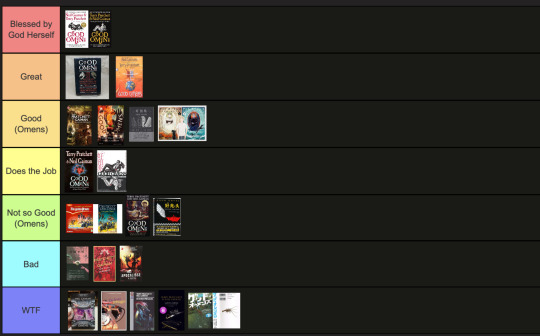
21. Labas zīmes, Latvian cover
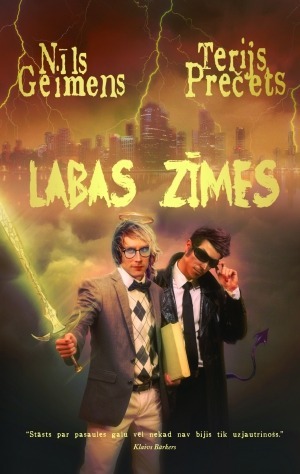
Our boys are back! And they are so ready to join the Dead Boy Detective agency. I would say that Latvians don't wear much tartan, so Argyle might seem like a similar print, but it just seems so... not Good Omens. Much like Crowley's flying purple people eater tail and Aziraphale's Conan the Barbarian sword, we're straying into niche AU fan fiction territory here. I mean, it's not *wrong*, but it certainly ain't right, either.
Tier: Does the Job
22. Bons Augùrios, Portuguese
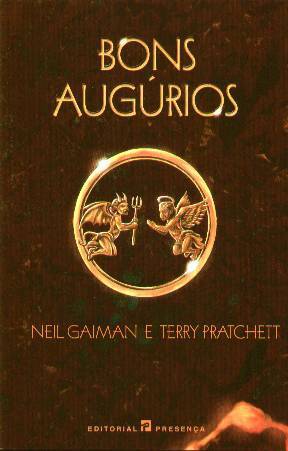
Let me start by saying this cover is so close to being in the blessed category. The layout and spacing are divine, the imagery is simple and whimsical, it reflects the humour inside the gravitas to give you an idea of the *feeling* of reading Good Omens. So few of these covers have gotten this aspect of good design right. Honestly, I would slow clap if it wasn't for that random FLAME JIZZ stuck to the bottom right hand corner of the book. Who's idea was that? Dagon's?
Tier: Great
23. Semne Bune, Romanian cover
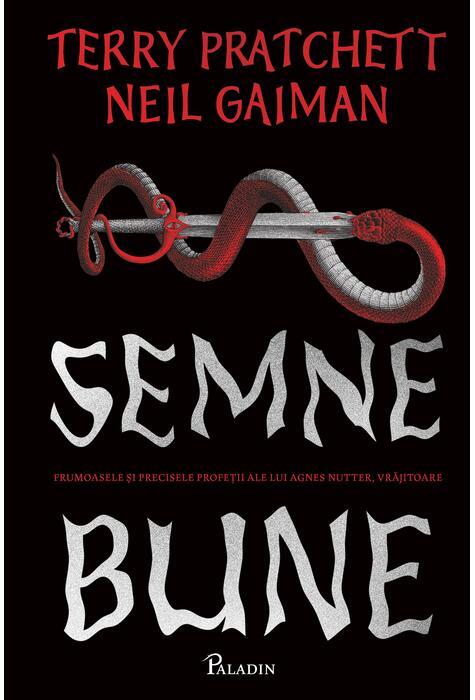
I admire two things about this cover: 1) Their utter commitment to a clean 3-colour palette and comprehensible layout. 2) Symbolic demon giving a principality head joke RIGHT ON THE FRONT COVER. This designer had balls. cotillion-sized balls. Now, does Aziraphale's sword have a sentient rooster tassel that watches said head-giving in horror? I sure hope not, but I don't see how that could be allegorical so, I'm torn. I feel like this goes in two categories for completely different reasons. And seeing as I'm in charge around here...
Tier: Great & Not so Good (Omens)
23. Semne Bune, Romanian cover cont.
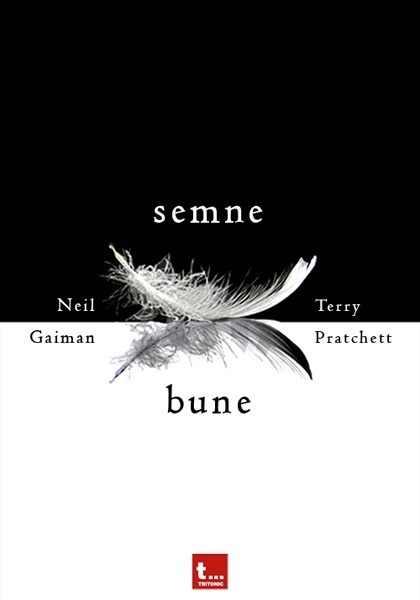
Compared to the last cover's gigantic double-entendre, this feels so tame and logical. The text is centred and balanced. There's breathing room, and we have wing symbolism! I've never seen a cover try to split Terry and Neil's names like that, which is a fun twist but BY GOD that center line is not straight near the right end of the feathers and it is sending this cover straight down to Does the Job. It's grounded there forever.
Tier: Does the Job
25. HYVIÄ ENTEITÄ, Finnish cover
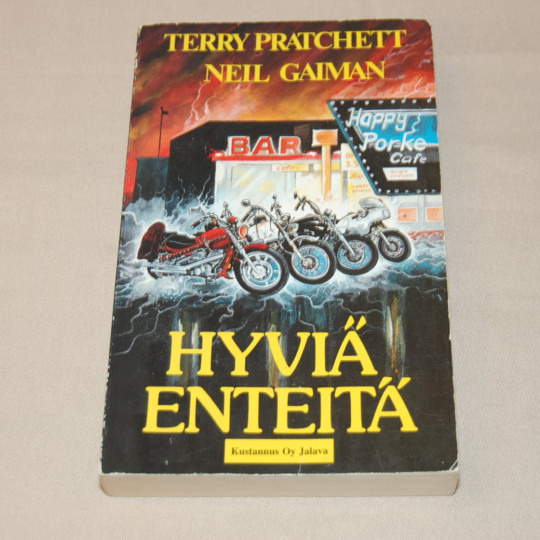
In this list, having something actually *relevant* to the main plot of the book and not mangling and main characters really puts you in rarefied air. All the motorcycles are book accurate which means somebody read something! Would I have ever picked the empty parking lot of Famine's restaurant as a subject worth a cover? Absolutely not. But the sick 80s lightning tips it into "fine" territory. The text is yellow. It's pretty.
Tier: Does the Job
26. Head ended, Estonian cover.
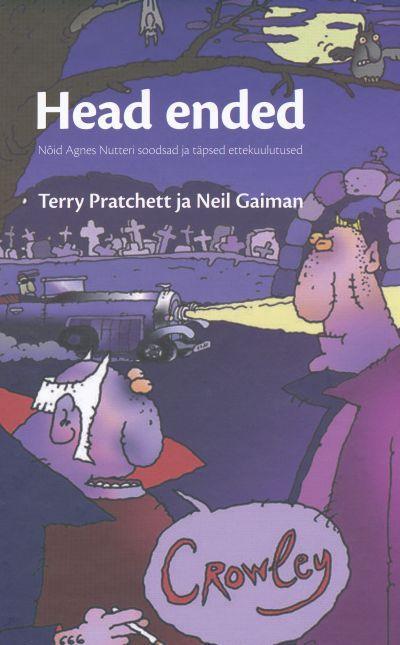
My face after staring at this cover for ten minutes and finally realizing that this is Hastur and Ligur waiting around for Crowley to pull up:
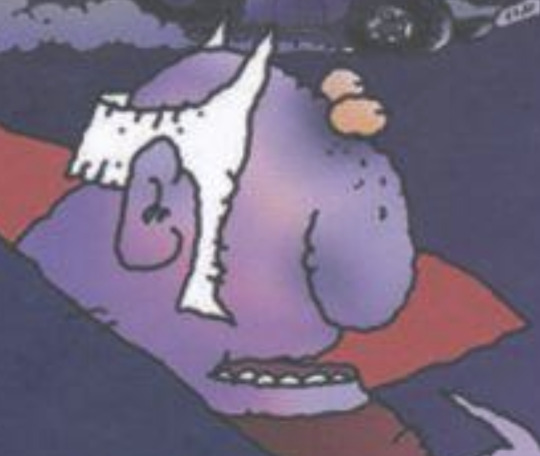
The artist's face after watching me do that:

Do I even need to rate this? It's called HEAD ENDED. I don't know how to be funnier than that.
Tier: WTF
27. Dobry Omen, Polish cover
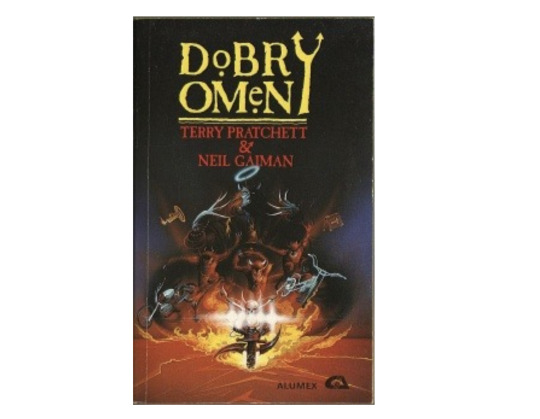
Some good points for trying to be original with the layout of the title by drawing a custom pitchfork "Y", but the heinous kerning and the fact the whole text block is not even centred kind of makes me take all the points back. I feel like we're pretty heavy on the demonic, extremely light on the angelic in this take. Maybe it's because on his death bed the lead guitarist of White Snake will finally admit to having designed this cover in his spare time.
Tier: Not so Good (Omens)
28. Good Omens, Hungarian cover
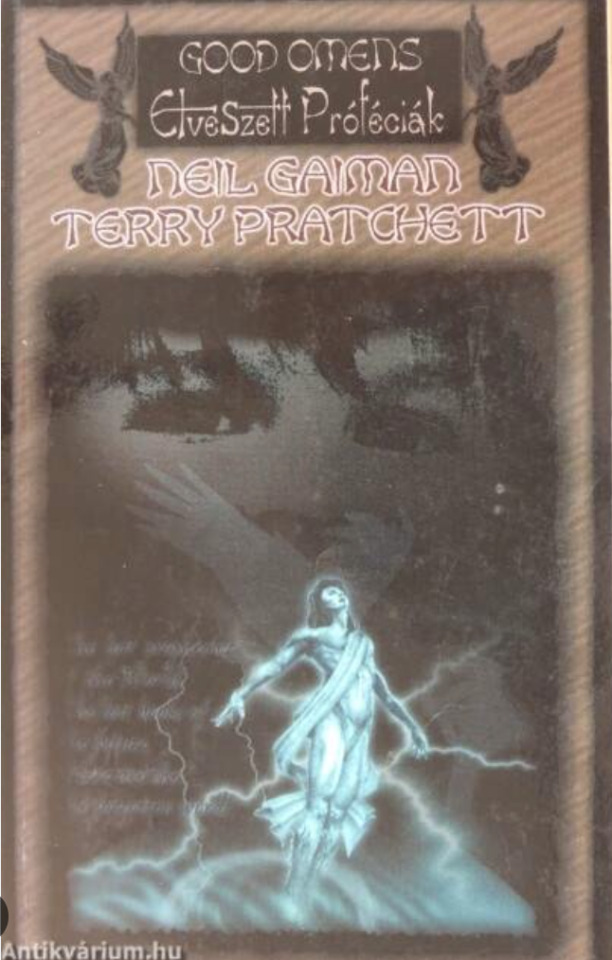
If I told you this designer did not read the book, and instead just watched the trailer of The Omen (the movie) and vibed this heinous brown carpet swatch into existence, you would one hundred percent believe me. I can't even talk about the faux belle-époque font right now. I am irrationally angry.
Tier: WTF
29. Good Omens, Bulgarian cover
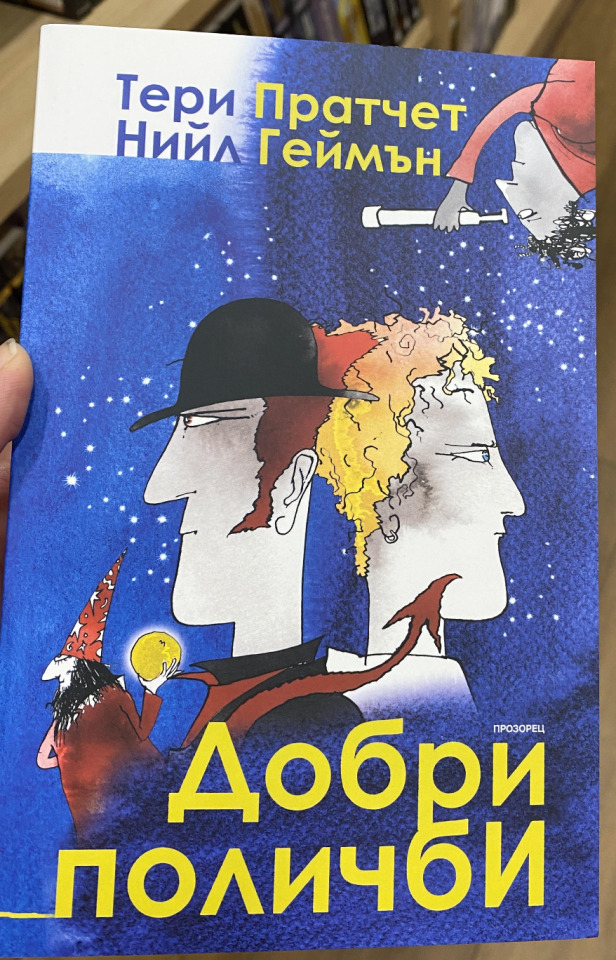
WHO. IS. DADDY. WIZARD?? Is all I can think when I look at this cover. Aziraphale & Grommet are recognizable enough, and you could make the case for telescope monkey being Adam, but I need to find this cover designer and shake them until they tell me who this deranged Gargamel is supposed to be. I must know.
Tier: Bad
30. BELAS MALDIÇÕES, Portuguese cover
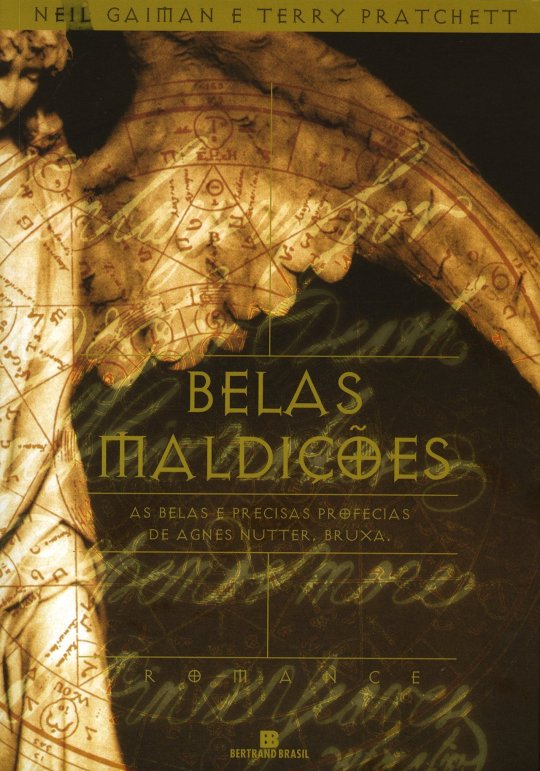
After all we've been through on this list so far, this truly sucks. It's not even weird. It's just puce text layered atop text to create a great yawn of a cover. Shout out to the designer of the Diablo PC game font, I hope you got paid.
Tier: Bad
Part 3 roundup:
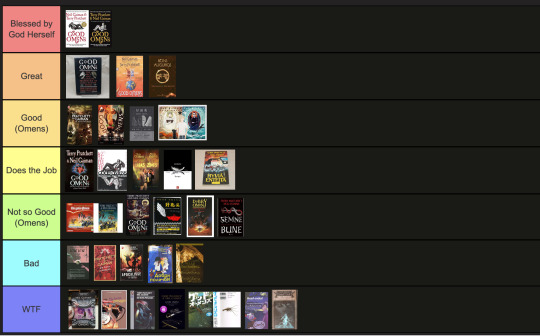
#good omens 2#art director talks good omens#go season 2#good omens#good omens fandom#tier list#good omens analysis#book cover#cover art#gomens
87 notes
·
View notes
Note
We would all like to know the top 25 books you’ve read this century please pleaseeeee 🙏🏽
(Context.)
OK, so the limitations I’m setting for myself are that these books must:
have been published some time after 1st January 2000 (in the edition I read them);
be good.
That’s it. The books are in alphabetical order by author’s surname, because there’s enough variety here that I wouldn’t feel comfortable (or rational) trying to rank each book objectively.
Fiction:
Bloodchild and Other Stories (2005) by Octavia E. Butler - The eponymous story is one of my favourite short stories of all time, and it counts within the time constraints because this is the second edition, with additional stories added. Butler’s commentary on her own works is always insightful.
Gone Girl (2012) by Gillian Flynn - Iconic story of an apex predator who wasn’t getting enough enrichment in her enclosure.
The Vegetarian [채식주의자] (2007) by Han Kang - Specifically the original version in Korean, not the translation.
Slave Play (2020) by Jeremy O. Harris - Very unsettling! The double (triple?) entendre in the title is a good summation of the play entire, I think.
OUT (2004) by Kirino Natsuo tr. Stephen Snyder - Often described as ‘feminist noir,’ Kirino’s writing explores the grimy underbelly of the daily lives of women and girls in modern Japan. Predictably, I have enjoyed all of her novels I’ve read.
The Sympathizer (2015) by Viet Thanh Nguyen - This novel is to me what Eliot’s ‘The Waste Land’ is as a poem to me. That will make sense if you’ve read both.
Theory of Bastards (2018) by Audrey Schulman - I adore every novel by Schulman I have read so far, but this one is definitely my favourite.
Impératrice (2003) by Shan Sa - I read this book as a teenager and was absolutely obsessed with it. Wu Zetian is boss.
Terminal Boredom (2021) by Suzuki Izumi tr. Polly Barton, Sam Bett, David Boyd, Daniel Joseph, Aiko Masubuchi, and Helen O’Horan - I also recommend the sequel collection by the same team, Hit Parade of Tears (2023).
Nonfiction:
Voices from Chernobyl (2005) by Svetlana Alexievich tr. Keith Gessen - Originally published in 1997, but I read the English translation first. I recommend everything Alexievich has ever written, honestly.
The Captive Woman’s Lament in Greek Tragedy (2006) by Casey Dué - You know when you read a book and it makes you feel like your entire body has been transferred to a different plane of existence? I love Dr. Dué’s writing about Euripides and Greek tragedy so freaking much.
Delusions of Gender (2010) by Cordelia Fine - If you’ve ever been trying to explain to a bigot that ‘basic biology’ is not as straightforward as ‘male brain’ vs. ‘female brain,’ this is the book for you. Dr. Fine is super knowledgeble, and the book is excellent at explaining the relevant neuroscience while debunking misogynistic and transphobic misconceptions about how the human brain functions.
How To Survive a Plague (2016) by David France - Really comprehensive book on the history of the AIDS epidemic and how it was solved.
The Landmark Herodotus: The Histories (2007) tr. Andrea Purvis ed. Robert Strassler - The entire Landmark series is excellent, and I highly recommend it. I chose the Herodotus because the maps really are invaluable, but the Thucydides and Arrian were close seconds.
People Love Dead Jews (2021) by Dara Horn - My favourite joke from this book is when Horn describes Anne Frank as ‘everyone’s second-favourite dead Jew... after, of course, Jesus.’
Arguments with Silence: Writing the History of Roman Women (2014) by Amy Richlin - Really I recommend everything Richlin has ever written, but I would like to specifically acknowledge her essay ‘Hijacking the Palladion’ (1992), which remains one of the best articles I’ve ever read on feminism and classics.
Appropriate: A Provocation (2021) by Paisley Rekdal - Really really interesting thinky book about cultural appropriation, appreciation, and interaction.
19 Ways of Looking at Wang Wei (with More Ways) (2016) by Eliot Weinberger - OK, this book is from 1987, but the expanded edition is eligible. This is a delightful and informative, albeit short, explanation of (some of) the difficulties inherent in translation.
Poetry:
The Collected Poems (2010) by Ai - This is also kind of cheating… Ai’s best poetry can be found in her Killing Floor (1973), which is included in this anthology.
The Iliad (2015) tr. Caroline Alexander - I enjoyed Emily Wilson’s translations of Homer as well, but Alexander’s translation of the Iliad is the first complete translation into English by a woman, ever. That’s really cool. Also, it’s a very good translation; I definitely prefer it to Wilson’s translation of the same. (I could go on for hours about the differences in translations of Homer.)
Phone Bells Keep Ringing for Me (2020) by Choe Seungja tr. Won-Chung Kim and Cathy Park Hong - My absolute favourite poetry by Choe Seungja can be found in her book ‘내 무덤, 푸르고’ (1993), some of which can be found in this collection of translated poetry.
Unfortunately, It Was Paradise (2003) by Mahmoud Darwish tr. Munir Akash and Carolyn Forché (with Sinan Antoon and Amira El-Zein) - This is cheating, somewhat, since I originally read most of Darwish’s poems in Arabic, and those versions were published mostly before the relevant time period. However, I do consider this translated collection of his works to be one of my favourite books, especially now that I have ‘edited’ it by hand-writing the Arabic versions of the poems in the margins. It counts.
Li Shang-yin (2018) tr. Chloe Garcia Roberts - Li Shangyin is one of my favourite Tang-dynasty poets, and this bilingual(!) edition of his poems is an excellent read.
Ilias und Odyssee (2008) tr. Johnn Heinrich Voß - Yes, another translation of Homer. Voß’s translation is from the late 18th century, but this particular edition has a bunch of specific appendices and stuff...! Anyway, this translation rocks.
Yi Sang: Selected Works (2020) tr. Jack Jung, Sawako Nakayasu, Don Mee Choi, and Joyelle McSweeney - Once again this is on the line, because I definitely prefer Yi Sang’s writing in the original Korean/Japanese... no translation adequately captures his style, in my opinion, but this one comes the closest.
Closing thoughts:
I do not usually read a lot of newer books (backlog, you know how it is), so I am extremely out of touch with the current literary zeitgeist. This is mostly by design. All of my favourite books in French, for example, were published before 1990, and my single favourite book (Les Misérables) was published in the mid-19th century.
Several of the books on this list I originally read in a different language (mostly French), but I’ve included the English version here if it’s the original OR if it’s the relevant edition for the timeframe.
This was incredibly difficult. Mostly because I had to flip through each book to see if it fit the requirements. I would be much better at curating a list of my favourite 100 books of the 20th century, I think. Or of the 19th century. Or even further back.
Everything about this list is subject to change 😅
#asks#talking about books and stuff#there were sooo many books I wanted to put on this list but couldn’t because they were published in the 80s or 90s rip#special shoutout to ‘Red Comet’ (Heather Clark)‚ ‘Yin Mountain’ (tr. Peter Levitt & Rebecca Nie)‚ & ‘Ghost Wall’ (Sarah Moss)#all three of which were THIS 🤏 close to making it onto the list
17 notes
·
View notes
Text
A compendium of references to Portugal in Japanese video games
The beginning of the historical relations between Portugal and Japan dates to the year 1541, when a Portuguese ship washed ashore at Jingujiura. Nearly sixty Japanese words are of Portuguese origin. A variety of Japanese traditions and culinary delights were introduced by Portuguese traders, sailors and missionaries. But in what way has this cultural exchange extended to the more recent phenomenon of Japanese digital games? As a portuguese devotee of Japanese culture, the topic seemed relevant enough to merit some additional exploration.
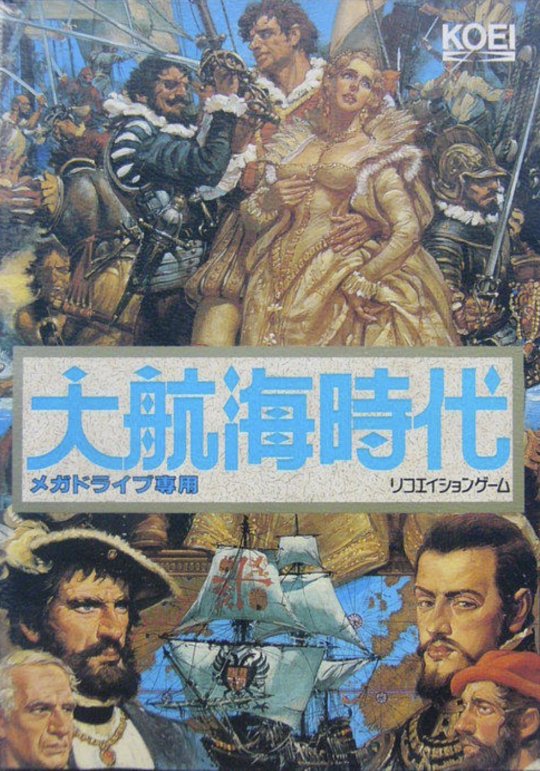
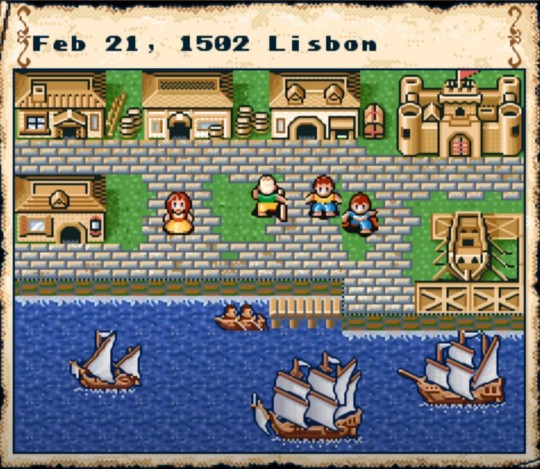
To my knowledge, the first significant reference to Portugal in Japanese video game is found in Koei's The Age of Discovery from 1990, a game published in the west under the title Uncharted Waters. The main character is a disgraced Portuguese nobleman named Leon Ferrero who resorts to maritime exploration, trade and naval warfare to restore his family's good name and prestige.
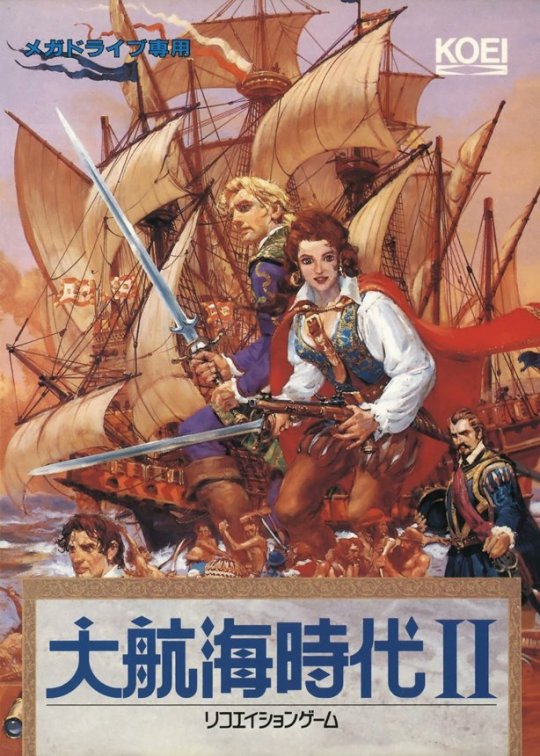
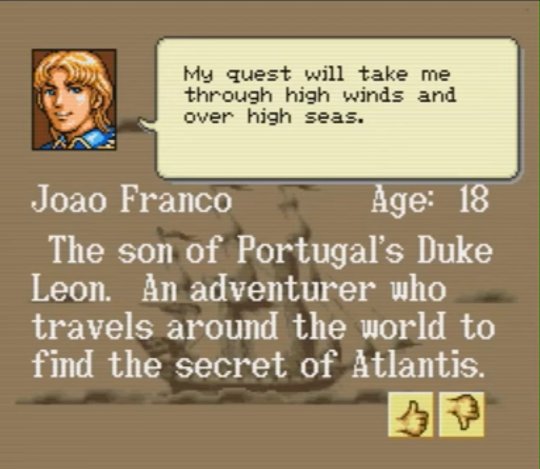
Its 1993 sequel, known in the west as New Horizons, diversifies the base game structure of the original by including multiple characters to select from, each with their own story and mission. Among them is the tale of João Franco, the son of the original episode's protagonist Leon, who sets out to discover the mysterious location of the fabled Atlantis, no less.
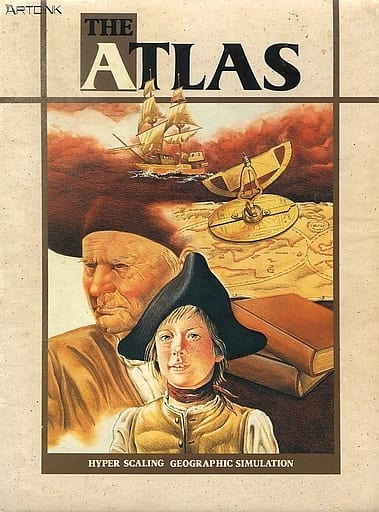
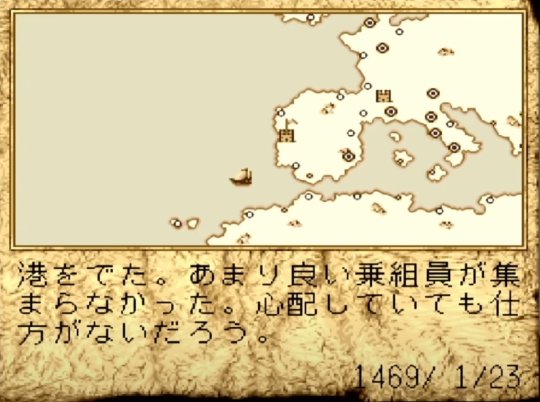
Another meaningful reference can be found a year later in ArtDink's 1991 strategy game The Atlas, in which the player takes on the role of a 15th century explorer with a five year contract with the King of Portugal to discover and chart lands around the Iberian Peninsula.
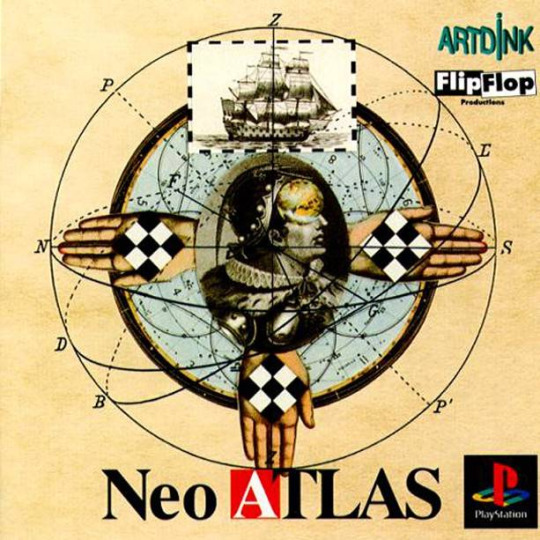

In 1998, ArtDink recreated the game for contemporary systems and published as Neo Atlas. The protagonist is a Portuguese trading company owner seeking business expansion opportunities in remote territories, as well as discover and chart hitherto unknown parts of the globe. A similar premise is found in a later sequel, Neo Atlas III.
Apart from nautical strategy games, a few other titles exist where mentions to the Portuguese territory, language and culture can be traced.

Galvanized by the success of Cyan's world-renowned point and click adventure CD-ROMs, Sony Computer Entertainment helped to publish The Book of Watermarks, a game designed by a miniscule Tokyo-based studio named Watermarks that is brimming with interesting first and second-hand references to Shakespeare's The Tempest. The objective of this visually impressive pre-rendered journey is to aid in the recovery of a series of ancient tomes, each including the nuclear bases of knowledge for mankind.
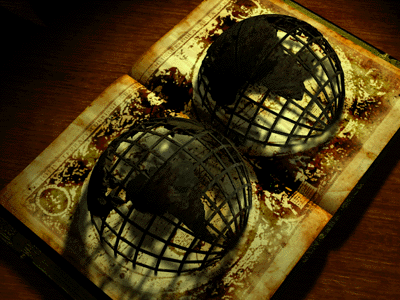
The very first lost volume is named the Book of Navigators, said to be owned by the historical Infante Dom Henrique from the 15th century, condensing information on shipbuilding, oceanography, geography and astronomy. While a purely fictitious book, the reference to Prince Henry is historically accurate, him being a pivotal figure in the early age of Portuguese maritime discoveries, the governor of the Order of Christ who at once built and ruined his reputation through his various campaigns in the African continent.
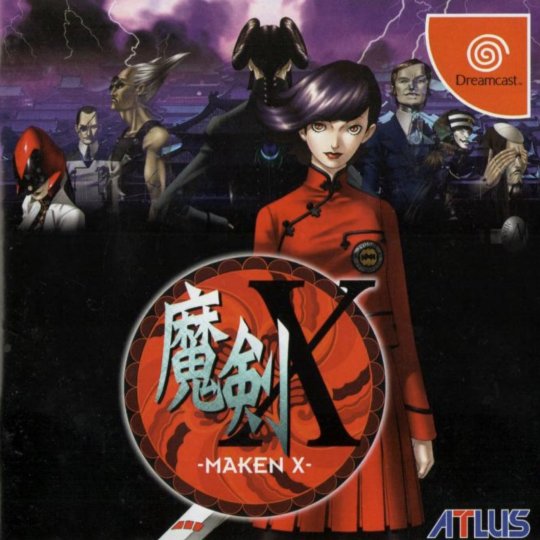
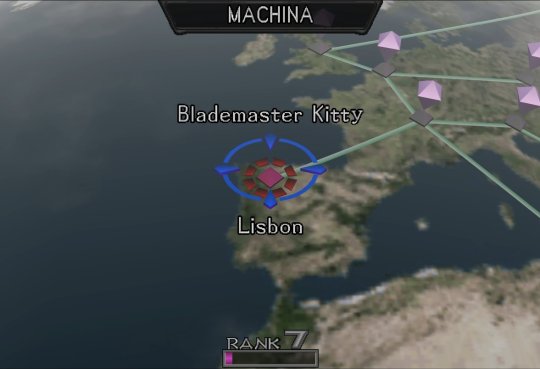
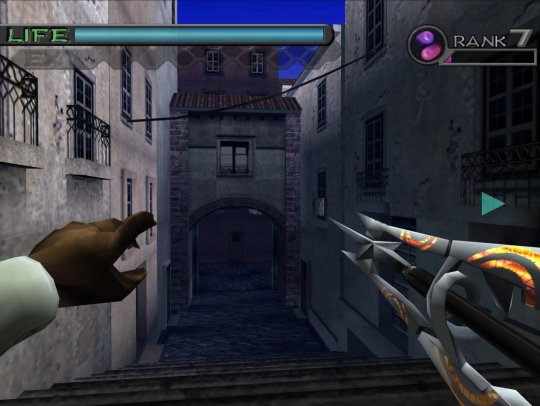
Atlus' futuristic vision of Earth in Maken X includes a most unexpected tour of Europe, with a mandatory stop in Lisbon. Inexplicably, the developers got its geographic location wrong and moved to all the way to the northern Spanish region of Léon. The level, itself, boasts a reasonably accurate depiction of one of the city's oldest quarters, Alfama, and the architectural styles found therein.
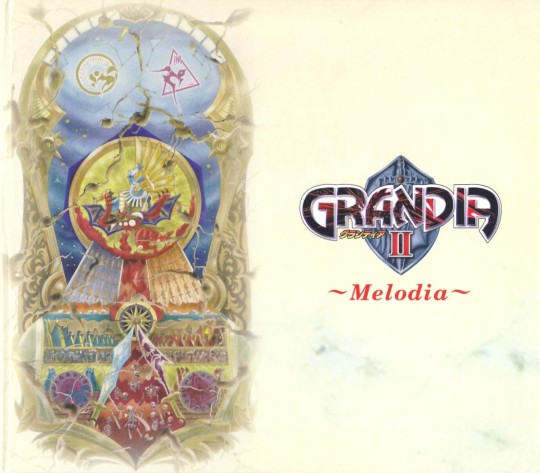

Although I could not discern any actual references in the game itself, the Grandia II soundtrack by the veteran composer Noriyuki Iwadare contains two themes whose lyrics are written in Portuguese: A Deus, a double-entendre that can be translated to both farewell and to God; and Canção do Povo, meaning People's Song. Also, the name of the official soundtrack is named Melodia, which translates to Melody as you'd expect. Both themes were performed by guest singer Kaori Kawasumi, who took on the composer's challenge to sing them despite her not knowing the language.
She was coached and assisted by José Álvarez and Motoi Sato from the Portuguese Arts and Culture Center in Japan, whom she thanks in the acknowledgement section. The Grandia II Special Package edition booklet contains a page with two photos of Portugal, one for the Jéronimos Monastery in Lisbon and the other, seemingly, for the Moorish Castle in the nearby town of Sintra.


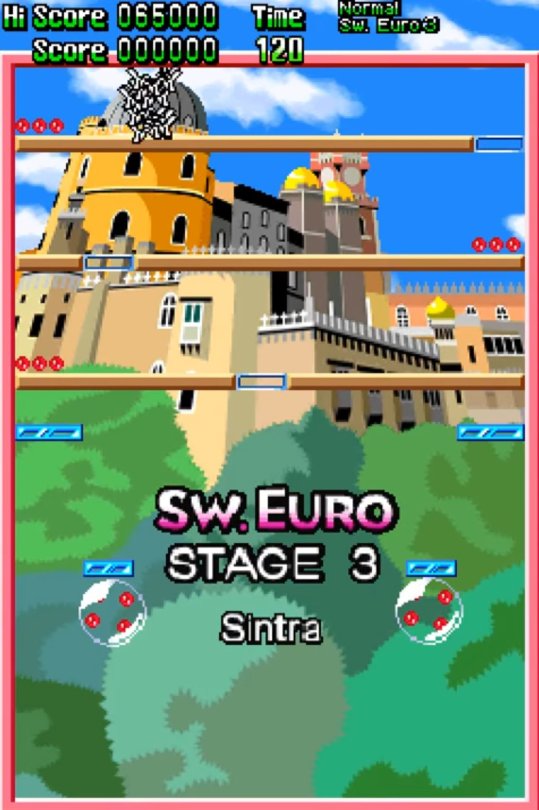
The last Pomping World (a.ka. Buster Bros/Pang) that Mitchell Corporation ever produced before shutting down was the 2010 DS European exclusive Magical Michael. It includes two levels set in Portugal, one in Lisbon by the Belém tower, a nautical landmark, and the other in the Sintra National Palace. Their representation is at once pleasingly stylized and true to life.

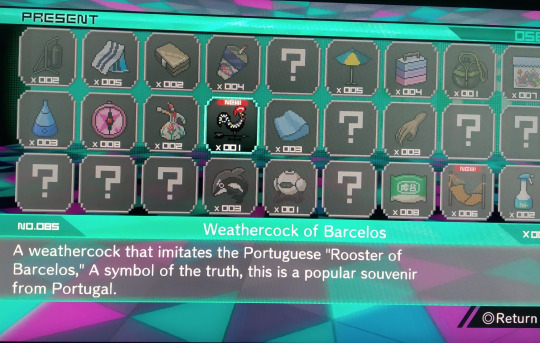
This final reference is found in Spike Chunsoft's third installment of their successful visual novel series, Nyūdanganronpa V3 Minna No Koroshiai Shin Gakki. Among the dozens of MonoMono machine items that can be acquired, one is a weathercock styled after a traditional Portuguese folktale hero, the Galo de Barcelos, meaning the rooster of Barcelos, a town in Northern Portugal.
As per the description, this animal became famous through an age-old tale involving a man wrongly sentenced to death who seconds before his execution remarked he was as certain to be innocent as it was certain that a nearby rooster would sing. Because the bird did crow, much to everyone's amazement, he was exonerated. Thus, the black rooster became a symbol for truth.
I would like to thank @diogojira and @DanielOlimac for their assistance in making this article possible.
#Japanese history#Portugal#culture#tradition#japanese videogames#portuguese references in japanese video games#Uncharted waters#the atlas#neo atlas#maken X#pang#magical michael#grandia II#koei#atlus#game arts#mitchell corporation#spike chunsoft#artdink#lisbon#alfama#Noriyuki Iwadare#kaori kawasume#sintra#book of watermarks
48 notes
·
View notes
Note
sorry if you've already stated this but i'm curious why/how you decided on the title for quantum meruit, and if there were other titles you were considering.
from the getgo i went looking for legal terminology. i wanted to pick something that sounded deep but was actually a pretty dry and boring legal concept because everything in this comic is designed to be half sincere and half a joke due to my love of both sincerity and jokes. i started literally just by looking at lists of legal terms and seeing if anything caught my eye. a couple of other ones caught my eye first but i can't remember what they were because as soon as i saw quantum meruit i was like okay yeah that's the one.
the literal translation of the latin is along the lines of 'what one is owed/what one deserves' and in legal terms it basically refers to the value of services rendered for an incomplete or breached contract. both of these meanings have some relevance to the comic so it makes a nice double entendre. i know exactly where and when i am going to put a title drop and if i manage to stick tiwh it that long its going to be very satisfying
53 notes
·
View notes
Text
Happy gushiwensday shabbes, gamers, tonight we have a very mysterious poem for you. It is called "Touring Xihu with Ma Haolan" and it is "by" Su Xiaoxiao.
Once they came here to sing and dance--
beauty like breathing--but when I turn to look they're dust.
The question is not whether lords are faithful, but who could entice them.
While we eat cold food, the pear blossoms open by themselves.
Young lord sailed a cloud to Heaven and ordered shut the gates.
Now I stand out on the balcony to meet the rain.
My true heart I tell only to the crane from over the sea:
the virgin forest stands straight and miserable in Xiling.
NOTES and original text under the cut.
和马浩澜游西湖诗
此地曾经歌舞来,风流回首即尘埃。
王孙芳草为谁绿,寒食梨花无主开。
郎去排云叫阊阖,妾今行雨在阳台。
衷情诉与辽东鹤,松柏西陵正可哀。
Okay so here's the thing. We're pretty sure Su Xiaoxiao existed, but we haven't been able to find a reliable source on any part of her life. Wikipedia claims to have some info on her, but its main source doesn't cite any primary texts, so, haha. As Baike says, her image is built on cultural memory and literary imagination. Laurence found a machine translated webpage that claims her ghost wrote this poem during a ?seance?. Lol. Was Ma Haolan in fact a local poet? Not sure! Have some translation notes!
beauty like breathing --- great idiom for outstanding talent, 风流 literally "flowing wind," it gives a lovely picture of the ease and naturalness with which such people perform.
The question... entice them --- UNTRANSLATABLE LINE. It's so so clever I'm over the moon about it. Literally it reads "descendants of nobility are fragrant grass, for whom are they green?" Idiomatically it reads, "descendants of nobility are excellent marriage prospects, for whom are they unfaithful?" I don't think Laurence quite agrees, but to me this seems like she's being a bit ironic. "Lords make wonderful bridegrooms! What's that, are they unfaithful? Well, is grass green?"
While we eat cold food --- the Cold Food festival roughly coincides with Qingming, it's in early April. I'm not sure if it's relevant, but it celebrates commemorates a faithful retainer who was poorly treated and had his house burned down by his regretful lord, following which nobody wanted to light fires on his death anniversary. Thus, no cooked food.
pear blossoms open by themselves --- I struggle with how to read this entire line because I'm not sure how it relates thematically to the rest of the poem. "by themselves" is literally "without a master." I don't think it's a reference to the phrase 梨花带雨 (raindrops on a pear blossom = crying beauty) but it does have an echo of the image.
from over the sea --- the crane is specifically from Liaodong, to the north on the other side of the Yellow Sea from Hangzhou, where I assume this poem was written.
the virgin forest --- 松柏 pines and cypresses is apparently a metaphor for being chaste/undefiled, but I'm not sure how relevant it is so I went for a bit of a double entendre.
7 notes
·
View notes
Text
@lady-merian replied to your post: I read a book I really enjoyed (a new TSG...
No, give us the rant!
Okay, you asked for it!
Fair warning: I am going to be yelling about superheroes again. Also the topic of sexual abuse/harassment, specifically as it applies to male characters as victims. I'm going to have to explain a lot, but I promise there's a point to all this eventually.
So I've been reading a lot of comics from the 1990s/early 2000s about the younger DC heroes, mostly Robin (Tim Drake), Impulse (Bart Allen), and Superboy (Kon-El/Conner Kent). And something I've been ranting to poor @brown-little-robin a lot about is how these comics handle these boys' love lives. Bart is mostly oblivious to romance, and Tim is very self-controlled (Stephanie Brown jokingly calls him "Boy Virgin"), but Kon...things start to get problematic there.
Kon is a clone, created by a shady genetic engineering project to be their mind-controlled replacement for Superman, who had recently died. He was supposed to be developed to maturity but escaped early, while physically about sixteen. His creators implanted him with memories of things someone of that age would know (education, pop culture, etc.), but he doesn't have a lot of real-world experience, and thus he's pretty naïve.
He's also a major flirt. Desperate for female attention. Hits on pretty much every woman or girl he meets. It's rather obnoxious. This is chalked up to his age and immaturity, or possibly to traits inherited from his human DNA donor, but I tend to suspect his creators wanted a clone who would really, really want to reproduce and pass those superpowered genes to more people for them to control. But whatever the case, this trait of his exists. And it has been repeatedly taken advantage of to put him in situations where he is vulnerable to sexual abuse.
Multiple grown women, who are fully aware that he is physically sixteen and chronologically much, much younger (one of them calls him "Kid," another refers to him as "jailbait"), see him as a romantic/sexual prospect and take advantage of his naivete and desire for romantic attention. Things happen to him that nowadays would be considered sexual assault of a minor, but in the 1990s apparently were seen as totally okay, even enviable--a teenager so attractive that even adult women are into him! If things were reversed, if he were a teenage girl receiving such attention from older men, this might be seen as creepy and predatory, but because he's male and therefore "wants it" this is all perfectly fine.
It's not. There are no adults looking out for him, he has no parental figures, no one to teach him about appropriate relationships and behavior with the opposite sex or point out to him that this isn't okay, so most of the time he doesn't question it, because it's his normal. But he does get hurt, and when he tries to talk about it, he gets shut down. One of his friends is actually rather judgmental toward him after an incident where he was being mind-controlled by a female supervillain. He is being abused, and the only way the narrative knows how to address it is to applaud it as admirable or blame him for the problem.
So...with all that in mind, I was going through issues of Kon's solo comic last night, screenshotting relevant panels for my own reference. And one of the issues was the second of a two-parter, a crossover with the Green Lantern comic that was running at that same time. So I tracked down that issue and got introduced to Kyle Rayner, self-described "anxious artist." He seems to be fairly young (early twenties?) and is struggling to find work, and the issue I read opens with his meeting with a potential agent, a middle-aged woman. He feels uncomfortable around her because she's got a reputation for preying on male clients. He's worrying that everything she says is a double entendre but berates himself for having "a dirty mind" and shrugs it off. But his instincts are correct; she ends their meeting by touching him inappropriately (while calling him "kid"). He does not respond to this, he takes the much-needed job she offers him, and it's never brought up again.
Really creepy. But he's male, and therefore the narrative can't acknowledge how messed up this is. So it's interesting to me that this issue goes on to have him pair up with Kon and briefly take on an almost older-brotherly role with him. Even so, Kyle's response to hearing that Kon has been recently dumped by his twenty-three-year-old girlfriend because she couldn't stand his immaturity any longer is...to agree that she had a point in doing so because this kid really is immature? Rather than pointing out that a twenty-three-year-old should not have been dating him in the first place! Here's someone who has first-hand experience with predatory older women, who could be in a position to empathize and advise, but he can't recognize that this situation is wrong...because he's had to normalize such things in his own life in order to survive. It's all incredibly messed up, and the narrative doesn't acknowledge it.
Apparently quite a few male heroes in this 'verse have been victims of sexual abuse. Dick Grayson (at age sixteen!). Wally West, I think. Even Bruce Wayne himself, depending on which version of the circumstances of Damian's conception you consider canon. As far as I can tell, their trauma goes unacknowledged by the narrative. And that really disturbs me.
Especially in the cases of boys.
10 notes
·
View notes
Text
I Have Never Been More Proud of this Boy
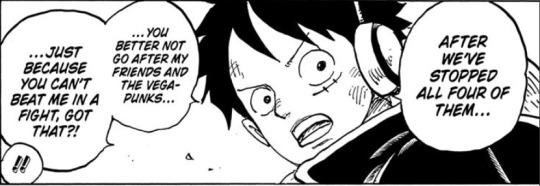
If nothing else, we’ll always have this shining, glorious moment. Luffy shortcuts the bickering by simply taunting Lucci. He knows it’ll work. Bare minimum he learned this in Act 1. Hitetsu grills him for being tactless, Kiku gets things rolling in Bakura in a way that makes a nice lesson, Luffy loves it and thinks she’s cool as hell, he’s already applying it by Udon. Love it, the doe-eyed samurai left her mark. Act 1 is when Luffy gets to have a fun adventure, it makes sense it’d be what sticks with him. That’s kinda been one of my basic points. The extent remains to be seen, but this is far from the only example.
Big picture, I’ve been thinking a lot about the Ox Bell lately. The big gesture, the coded message. Hell, Zoro being the one who struggled. Feels like it was Rayleigh’s idea, right? Very uncharacteristic for Luffy. Either way, it is an example in the story of this concept we’ve applied to Wano. Making a big ruckus, a huge spectacle of a story...that was ultimately insignificant and just a vehicle to slip out a coded message to the people who’d get it. Pairs nicely with an arc built around a massive historical epic in the making where the real point lied in the subtle undercurrent beneath the spectacle. That’s not the only reason that part of the story has been on my mind though.
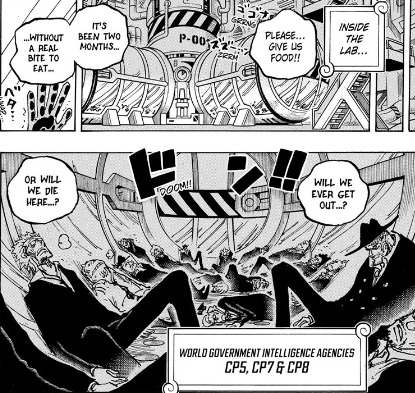
The timing, the time frame. That’s interesting. Two months or so at this point would coincide with both the reunion at Sabaody and when the samurai who leapt forward arrived. Kiku’d been in Okobore around a month, Wano was about a month, it’d probably fall around when the Strawhats were inbound. Just...don’t forget all that stuff about the Tamataebako and time being a big theme even just here on Egghead. The idea this wasn’t Vegapunk and it’s been going on under his nose for a while is very intriguing. He’s the type of guy who could pull off a big brain gambit so I wouldn’t be shocked to find out he’s still pulling the strings, but this makes the conspiracy truly wild. Being active for two months limits our potential culprits though.
Then of course the cutaway to Shanks. One thing I’m starting to feel for sure, there’s a difference between cutting to one or two side stories and showing every major ally tied up in their own clashes. It feels like the point is...no one is coming to bail you out this time. Excellent use of the Sabaody parallels. You’re an Emperor now, sink or swim.
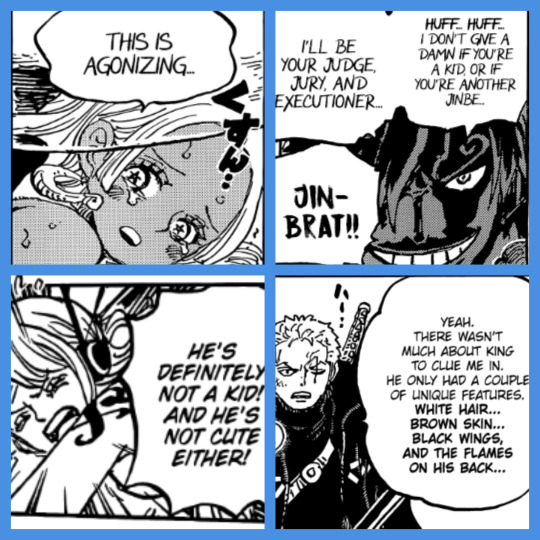
Now we get to 1077. First off, the title. Don’t like to dwell too heavily on this type of thing but it feels relevant here. A lot of Wano’s feel like they could be a double entendre. Referring to something explicitly there but also one of the subtler threads. Yes, Kiku often ends up being one of the subtler threads that gets these more than most. So here we have “You should have figured that out sooner.” Applies to Zoro directly and hey, it’s a scene that tracks well with his Wano story. Put the pieces together man, you should have figured out you had ancestral ties waaaay sooner than the fight with King even if you didn’t really care not to mention you should know not to pry too deeply into nice ladies’ secrets.
That’s just one of four callbacks though. Each one the exact type of thread we talked about well before Egghead, some we’ve seen elsewhere in the arc. Franky & Usopp fall victim to S-Snake’s charms, a trick Bonney pulled on Vegapunk. Sanji’s going reverse-swirl demon mode. Nami’s struggling with hurting an image of a friend. Sentomaru sets up that something baaaad is about to go down, then we see everyone tied up in that cycle of these core themes. Leading to our finale...
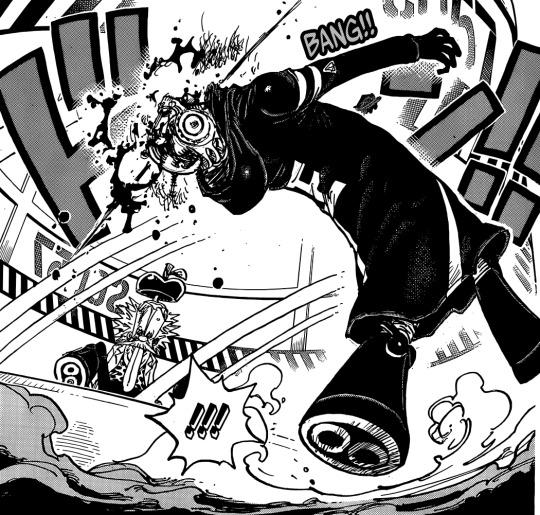
Not Shaka! I...actually kinda assumed he was the traitor y’know? Idea of the pure “good” falling into thinking treachery for the greater good was justified. But here he is getting capped right in front of himself. What a wild turn. Presumably whoever it was followed him down, and it’s very interesting that we see a normal gun barrel instead of something sciencey. Remember, whoever’s been doing this has been at it for two months. Whoever it’s been has seemed pretty adept at utilizing the Seraphim and cool tech too, so a regular gun feels weird. It’s also strange they’d just bump off Shaka and leave.
Because I’m still on my bullshit though...what if it is Shaka who’s been pulling this? World’s smartest man can probably act a little, especially with their face hidden. So then what we’d be seeing isn’t the reveal of the traitor...but the savior. The logistics would really make it hard to be Kiku or any potential unknown-to-us new member...but I can’t say it’s implausible to introduce your quartermaster by having her instantly short circuit a mystery because we need to GTFO. Always been 50/50 on a third sword or a pistolero, and keep in mind the structure of showing the climax first before walking back to fill in gaps means logistics aren’t the biggest hurdle. Especially with the potential appeal of this being Oden/Toki’s island. It’d look like Robin on Jaya, she just casually knocked out the research while Luffy, Zoro, & Nami failed into a significant side story that was ultimately a distraction. Feel like doing the twist through the Grand Fleet sounds more doable though, either way at this point it’s mostly just fun it isn’t that hard to make it work.
Still, if this is the actual tipping point it feels better for someone else. And it could very well just be simply the real traitor adding to their body count. Honestly sounds more likely. Feel like the next pair are going to start offering more clarity, but as always this is a hard series to predict. The story is slapping you with a full round of the core themes in a chapter titled “You should have realized it sooner,” that undertone Kiku propped up is just a blatant part of Egghead and we’re well past that point.
12 notes
·
View notes
Text
Me: "Today's challenge: only write for 20 minutes, be in bed by 1!"
1353 words, 90 minutes, and an hour past bedtime later: "Goddammit 🙈"
I'm... not 100% sure if I will leave this chapter as is, and if I'll actually use it as part of @jazzfic's prompt-fill collection 🤔 Might be a little too silly and not exactly on topic... But it is also way too funny not to share, so here goes 😋
(I apologize that this is very long for one of these "snippets", but I also already posted the entire Soji chapter, and that's 300 words longer, so...)
Context: This is probably set a good while after season 1. The Motley Crew have been to Earth and have met Picard's Romulan spouses housekeepers (this will become relevant later)
Also: Rated T for Truly Bad Double Entendres
---
“Admiral…”
“I’m fine.”
“I really must insist —”
“I appreciate your concern, Emil, but I don’t have time right now.”
“I’m afraid you’ll have to make time.”
“Don’t you have other things to do?”
“Nothing that would take precedent.”
The door to the captain’s quarter’s whooshed open and Rios stepped out, seemingly deep in thought.
“Rios!”
At Picard’s call, the captain looked over and raised his eyebrows. “What?”
“A little help, please.”
Emil huffed, but Picard ignored him.
Rios took his time, lighting his cigar as he leisurely strolled across the deck to the door where the little stand-off was taking place. When he reached the two combatants, he looked at Picard expectantly. “What can I do for you, Admiral?”
Before Picard could say anything, Emil cut in: “Captain, I’m afraid Admiral Picard may have been exposed to a viral contaminant on his last diplomatic outing.”
“Nonsense.” Picard shook his head. “I’m perfectly fine. Besides, if I had picked up anything, the transporters would have caught it.”
Rios took a drag from his cigar. “That’s what we thought when Soji got that synth-flu last month.”
“Precisely!” Emil triumphantly shoved his hands in his pockets and looked at Picard, as if daring him to find a new excuse.
The old man was still holding on to magnanimity, but his patience was visibly starting to fray. “I thought we fixed that?” He gave Rios a look that made it clear when he said ‘we’ he meant ‘you’.
The captain scratched his beard. “Ian has been working on new protocols for the biofilters, but we still don’t know what we’re even looking for. The Coppelians and you are the only organic synths in the Federation, and they don’t exactly have a lot of experience with space bugs over there.”
“This is ridiculous.” Picard ran a hand over his bald head. “I need to place an important call to Earth. I can hardly do that while I’m stuck in sickbay.”
“Our sickbay is equipped with perfectly good holo-displays.” Emil’s quip earned him a withering look.
Rios sighed and turned to his EMH. “How long do these tests take?”
“Fifteen minutes.”
Rios looked back at Picard. “That doesn’t sound too bad.”
Picard crossed his arms. “No, I’m sorry, I do not have time for this today. This call is of the utmost importance.”
“So is your health, Admiral.” Emil sounded almost plaintive now. While he launched into another lecture about the horrors of unknown viral infections, Rios took a pensive drag from his cigar.
When Emil took a brief pause to simulate drawing breath for his next point, the captain said: “Isn’t there some planet-wide emergency drill situation happening on Earth today?”
Emil looked peeved to have been interrupted and he leaned back with another huff.
Picard’s posture suddenly seemed a lot more tense. “I’m not sure I know what—”
“Yeah, Seven mentioned it after she sorted through the subspace messages from Starfleet this morning. Communication networks will be shut down all throughout the day. I don’t think you’ll be able to reach anyone.”
Picard put on a very dignified air. “It’s a rolling drill and does not affect the entire planet at once.”
“Huh.” Rios seemed to be satisfied with that, or at least not intrigued enough to poke into the Admiral’s private affairs any more.
Emil, however, had no such compunction. His eyes shimmered as he accessed the ship’s systems, then he said: “Depending on time zones and subspace distribution hubs, communications are shut off for most of the day and well into the night. Right now, the only places not affected by the blackout would be the Atlantic Deep Water Colonies, the British Isles and parts of… Oh.” A much too knowing smile spread over the EMH’s face.
Picard looked like someone had offered him luke warm Earl Grey.
Rios, clearly annoyed at being out of the loop, glared at his EMH and snapped: “What?”
“My private affairs are nobody’s concern but my own,” Picard said haughtily before Emil could even open his mouth.
“Private…” Finally, Rios seemed to be catching on as well. “Oh.” He looked at the still-closed door to the holodeck which the EMH was guarding, then at Picard and raised his eyebrows. “Really? On my holodeck?”
Picard threw up his hands. “I have no idea what you’re implying, and I’m sure I want no part of it. Now, if you two are quite finished violating my privacy, I have a call to make.”
“But Admiral —”
Before Emil could start another round of medical complaints, Rios barked: “Deactivate EMH!”
As he faded away, Emil shook his head and muttered something about manners.
In the relative quiet, Rios took another drag from his cigar. “You know,” he said in a carefully neutral voice, “Raffi recently acquired some very interesting programmes that work well over shared subspace holo-streams. I’m sure she’ll lend you a copy if —”
“Yes, thank you Rios, that’s quite all right.” Picard quickly turned and hit the door release on the holo-panel that had appeared as soon as Emil deactivated.
The door slid open, but instead of the tranquil afternoon sun of the Château Picard, a loud shriek spilled out of the holodeck, followed by the splash of water and a shouted: “Occuppied!”
A large sponge, covered in bubbles was hurled towards the door. As part of the current programme, it would have disintegrated as soon as it crossed the threshold. Fortunately, the changes Ian had made to the holo-emitters on the upper deck last month when they’d had a ship-wide snowball fight were still in effect. The sponge only dithered for a nanosecond before it arched past the doorway and landed squarely in the Admiral’s face.
“Well, I tried.” Emil materialized next to Soji and Enoch, who were half-cowering behind one of the large cargo crates at the back of the deck.
Ian took a step towards him and patted his shoulder in sympathy. “I told the lassies to make sure they activate the privacy settings, but they’re always in such a hurry…”
Soji was working very hard to keep a straight face. “You made a valiant effort.”
The sponge peeled off Picard’s face and landed on the floor with enough force that a cloud of soap bubbles erupted in all directions.
“I see Raffi used that new soap recipe I recommended,” Ian said cheerily. “Very good for bubbles, perfect pH balance, and extra slippery.”
Soji bit down on her hand and ducked fully behind the cargo crate, tears streaming down her face as she tried not to make a sound.
“Though I’m sure Seven was the one who threw the sponge,” Ian continued. “She has truly impeccable aim. Must be that xB strength I hear so much about. That must come in very… handy.”
Enoch ducked down next to Soji, and the two of them grabbed onto each other, struggling to keep quiet.
Picard was standing frozen, eyes closed, clearly too mortified to move. A coronet of soap bubbles was settling on his head, and another one landed on the tip of his nose with grace that clearly bespoke excellent programming. Yes, definitely the new recipe.
Inside the holodeck, the shouting and sloshing continued, while next to the door, Rios was doubled over, laughing so hard he had dropped his cigar.
“Should someone tell the Admiral that he is standing too close for the safety protocols and the door won’t close until he steps back a bit,” Ian asked innocently, “or should we wait until Raffi and Seven find something bigger to throw at him?”
“Not bigger, necessarily,” Emil mused. “Something a little more solid should do the trick. Maybe easier to grip… I’m sure they must have many suitable objects within reach.”
A series of indelicate snorts and strangled coughs erupted from behind the cargo crate.
Emil clicked his tongue. “Well, at least now the Admiral will have plenty of time to submit to a full virological scan. After this experience, he’ll probably have to lie down for a few days.”
Ian could have sworn the EMH had a mischievous grin on his face as he shivered away again.
#star trek picard#star trek picard fanfiction#emil (emh)#jean-luc picard#cristobal rios#ian (eeh)#humour#nsfw-ish#raffi musiker#seven of nine#and various other crew that get mentioned...#anyway#one day i'll develop this elusive ability known as self-control...#though i'm still not fully convinced that isn't a complete myth...#prompt fill#@jazzfic#lili's writing adventures#writing accountability#bed rest#kind of#maybe a standalone thing#we'll see
9 notes
·
View notes
Text
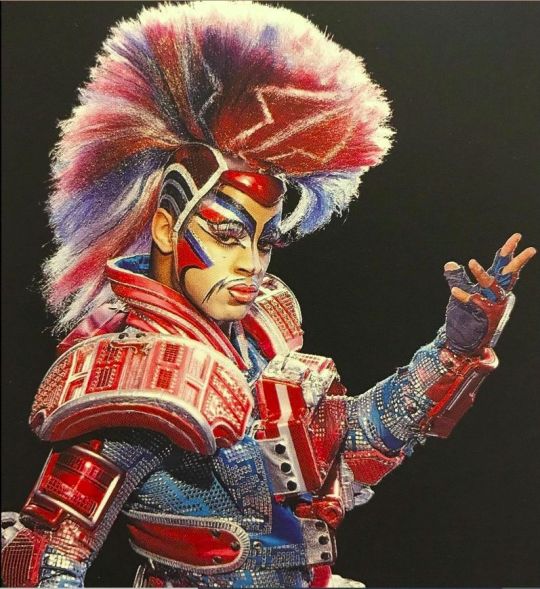
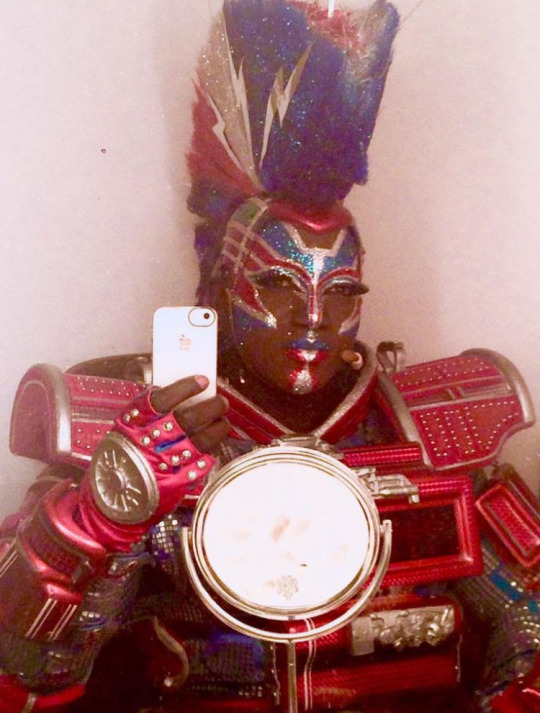

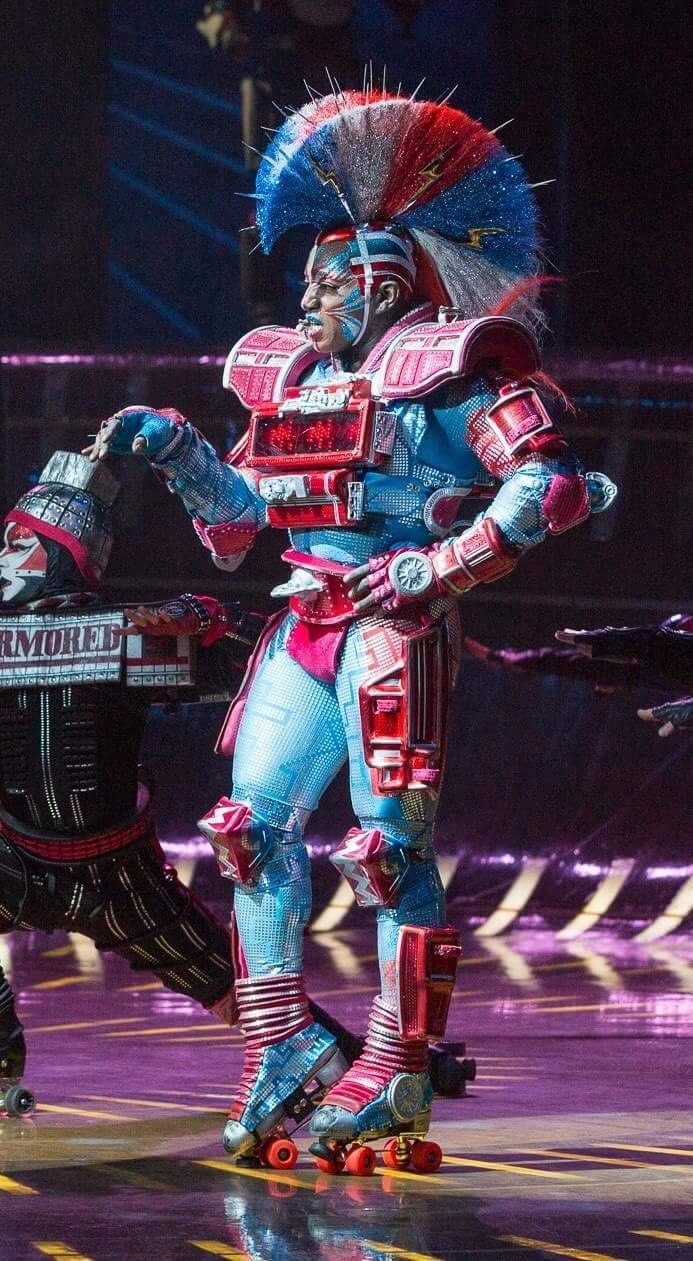

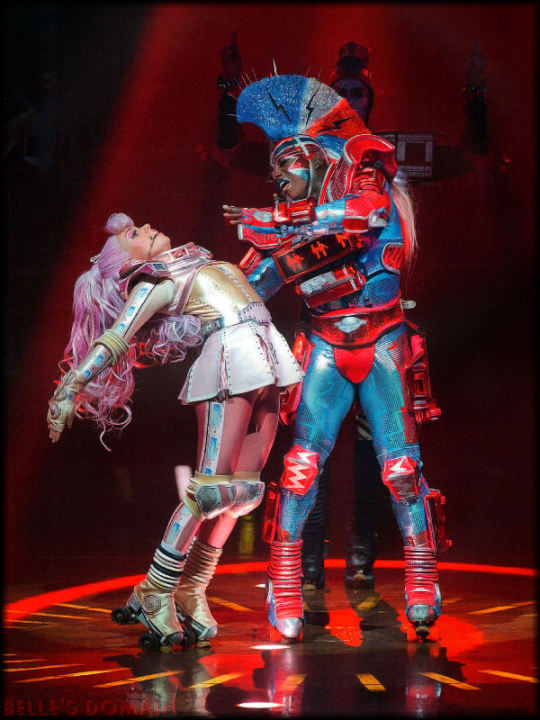
Stex Appreciation Month: Electra
Fav actor: Koffi Missah is the best overall. I think the MJ/Prince train angle is the most effective characterization for Electra and he looks, acts, and sounds perfect for that approach. It’s fun and recognizable in the cheap seats in a language you don’t know. But it also has a lot of potential for depth, there’s a double entendre to be made about the government/big companies conspiring against electric trains for being too successful and certain tropes about electrical powers.
Mykal Rand is basically impossible to beat aesthetically for me. I cannot look away from the absurdity of how smooth and girly his face is combined with how cartoonishly ripped he is. Even footage of him on tiny tour stages in beat up ill-fitting costumes is captivating. He’s just so extreme and maximalist yet alien looking.
I’m surprisingly unpicky on Electra actors as long as they aren’t boring. That’s the only real crime. But I tend to prefer ones who have/could pull off Greaseball because I prefer a bolder, louder Electra (and basically require it post 2018 so I don’t forget he even exists with that borderline camoflouge costume)
Fav songs/scenes: Dinah’s Disco because I love watching him get shoved, a nice more intense version of AC/DC, anything involving No Comeback or its leitmotif. Once again, What Time Is It? is a terrible song but purely redeemed because Mykal is hilarious in it.
Fav costumes: Broadway/Bochum toothpaste is a classic, but I’m also weirdly fond of Late London because I love the cartoony look (especially on Chris Copeland since he went all in on the makeup style to match)
Ships/Friendships: already went over how I view him and Greaseball the other day.
I like to look at pictures from the JPN/AUS tours out of context and think Electra looks cold and lonely and in need of a buddy and Caboose coaxes him into fun bad ideas
Headcanons:
-I habitually call Electra “he” because it’s what canon does 90% of the time, but view the character as neutral (all of them really). Electra and the Components are about the only ones smart enough to realize these forms are an illusion and there’s no reason to play by human paradigms, it would be equally stupid if they subscribed to blood type personalities too. They are VERY smug about this but slowly the message is spreading.
-I vary in what exact basis I’ll give him but see him as either irl, alternate timeline, or outright sci-fi Amtrak’s choice of successor to the GG1. He isn’t weak or terribly delicate if the infrastructure works (unless you keep him as 40101 lol), he follows in their tracks of being a huge effortless machine that’ll run away with basically anything you stick on it. If he actually played it clean, he’d probably dominate going uphill vs Greaseball and especially Rusty, he just doesn’t flaunt strength much in canon because it’s not relevant to the race.
-Electra is a Fully Automated Bi Space Communist who wants to run catenaries across the Rocky Mountains and Siberia
-If you turn the dials and knobs Electra will morph like a game’s character slider just like how it’s simple to regear electric locos for passenger/freight use.
Unpopular opinions: lmao I think all my Electra preferences are moderately to very fandom unpopular. I’m a contrarian who likes the character for fundamentally different reasons than most. I’ve vaguely known of the character for years but didn’t really fall in love with him until recently when I saw those 2013 tour videos people either love or hate. Yeah they have the worst staging and costumes but I went “oh hell yeah finally a less problematic alternative to my blorbos Ganondorf and Velvet von Ragnar”. I think those two names alone make it pretty clear why I like a bulkier, hotter natured, more affectionate and competent Electra than most. I crave novelty and get bored by oversaturated things so I’m naturally drawn to androgynous characters that aren’t twinks or prettyboys so seeing Mykal vs the more typical tall skinny Electras really made me more interested in the character, even if I think there’s more interesting characterizations than his.
#stex electra#stex appreciation month#dear god imagine koffi as greaseball he would look hilarious because he’s so small but if he wasn’t he could work well
1 note
·
View note
Text

Milton + esperanza
The release of this record prompts a wagon load of links. First, the introductory notes and video at the link above are great.
Second NPR's Tiny Desk (Home) Concert is really nice.
And a wonderful reprise to it is the music video of Outubro.
Spalding first heard Nascimento on Wayne Shorter's collaborative 1975 record Native Dancer. My most memorable hearing of Milton Nascimento was his song Anima on David Byrne's 1989 compilation Beleza Tropical - Brazil Classics !. That record made quite an impression on me. It's hard to believer it's been 35 years, but the album is still in print and worth listening to. There's alsoi s short documentary on the record on Youtube.
In the early 1970's before my sister married her Brazilian husband they lived with us for a short while. He had some albums and among them were a few by Chico Buarque. At the time I reacted to hearing them rather like I imagine I'd have reacted hearing Frank Sinatra records. But on Beleza Tropical is the song Cálice written by Chico Buarque and Nascimento. I was living near my sister and brother in law when I discovered Byrne's compilation. My brother in law explained the the double entendre key to understanding the song: Cálice is a chalice or cup and in spoken Portuguese the word sounds almost exactly like word for "shut-up." There was a slight catch in his throat as he told me and that made me realize that his is a freedom song.
For historical context the Wikipedia article, Military dictatorship in Brazil is very good. And a blog post, Cálice – Humming Against the Dictatorship captures a concert performance where Chico Buarque and Gilberto Gil who were forbidden to sing the lyrics to the song. So hummed them and still had to flee into exile. Here is a video of Buraque and Nascimento performing the song.
On the Manhattan Transfer's 1987 album Brazil is a song Hear The Voices (Bahia De Todas As Contas). The lyrics on that album are mostly in English, so i grokked a lot more. And this song seems to reference Gilberto Gil. His songs were banned on the radio but his popularity popularity increased. People were taking their record players out on the street and cracking up the volume.
Luaka Bop has eight Brazil Classic releases. And there are many ways nowadays to explore music from across the globe. Caetano Veloso"s book Tropical Truth: A Story Of Music And Revolution In Brazil helped me to understand the music on Beleza Tropical a little more than ten years after first hearing the record. The book also was a touchstone in my opposition to the Iraq War. And is still relevant with the current rise of right-wing authoritarianism.
Music and language can be liberating. Milton Nascimento and Esperanza Spalding's collaboration is beautful and inspiring.
1 note
·
View note
Text
Double Meaning Jokes in Hindi: A Laughter Riot
Humor is an essential part of human life, providing a much-needed respite from the daily grind. Among the various forms of humor, Double Meaning Jokes in Hindi hold a special place. These jokes are clever, witty, and often cheeky, making them a favorite among people who appreciate a good laugh. The unique aspect of these jokes is their dual interpretation, which can be understood differently depending on the context and the audience.
What Are Double Meaning Jokes?
Double meaning jokes, also known as 'Shlesh' in Hindi, are a type of wordplay where a single phrase or word can be interpreted in two different ways. These jokes often involve puns, homophones, or double entendres. The humor arises from the ambiguity and the clever twist that leads to an unexpected punchline.
Popularity of Double Meaning Jokes in Hindi
Double Meaning Jokes in Hindi have been popular for generations. They are commonly shared in social gatherings, family functions, and among friends. The charm of these jokes lies in their ability to be innocent on the surface but with a hidden, often naughty meaning underneath. This duality makes them suitable for different audiences, as the deeper meaning is usually picked up only by adults.
The Charm of Double Meaning Jokes in Hindi
Double Meaning Jokes in Hindi are essentially jokes that have two interpretations. One interpretation is often straightforward and innocent, while the other is more suggestive or risqué. This duality is what makes them so amusing. The beauty of these jokes lies in their subtlety and the cleverness required to craft them. They rely on the audience's ability to understand the double entendre and appreciate the humor embedded in the language.
For example, a popular Double Meaning Joke in Hindi goes like this: "Teacher: Tumhare ghar mein sabse bada kaun hai? Student: TV!"
On the surface, it seems like a simple question and answer about household items. However, the underlying humor is in the unexpected response, playing on the word "bada" (big) which can have different connotations depending on the context.
Why Are Double Meaning Jokes in Hindi So Popular?
Cultural Relevance: Double Meaning Jokes in Hindi resonate deeply with the cultural nuances of the Hindi-speaking population. They often draw on everyday experiences and familiar scenarios, making them relatable and enjoyable.
Linguistic Richness: Hindi, with its vast vocabulary and regional variations, provides a fertile ground for wordplay. The language's ability to convey different meanings through tone, inflection, and context adds layers to these jokes.
Social Connection: Sharing Double Meaning Jokes in Hindi can be a social activity that brings people together. They are a staple in informal gatherings, fostering camaraderie and light-heartedness.
Cleverness and Wit: These jokes appeal to a person’s intelligence and sense of humor. The clever wordplay involved requires a certain level of wit to both create and appreciate, making the humor feel more sophisticated.
Examples of Double Meaning Jokes in Hindi
To illustrate the humor and creativity involved in Double Meaning Jokes in Hindi, here are a few examples:
Joke: "Boy: Tumhari aankhein bahut khoobsurat hain. Girl: Shukriya. Boy: Par jhooth bolti hain." Interpretation: Complimenting the eyes and then adding a twist by suggesting they lie, creating humor through unexpected turn.
Joke: "Wife: Suno ji, woh jo TV par hero hain na, tumhare jaise dikhte hain. Husband: Waah, waah! Kaun hero? Wife: Shakal se bandar jaise." Interpretation: Initially flattering the husband, only to deliver a punchline that compares him to a monkey, playing on expectations.
Humor has always been a vital component of human civilization, cutting across linguistic barriers. Double meaning jokes are unique among humor genres because of their deft wordplay and ability to make people laugh. Particularly in Hindi, Double Meaning Jokes have become very popular since they may amuse a wide range of people. The comedy and variety of the Hindi language are demonstrated by these jokes, which are renowned for their humorous ambiguity.
0 notes
Text
rules of attraction:
ahh lots of cal stuff in the previously you know what that means!!
rita and iain walking in to work together for the third time this week👀
oh wait technically this is the start of rita’s exit storyline >:(
i don’t remember robyn max and lofty moving but this is definitely a different house than the one they used to live in, they used to have to get the bus to work but this is the one that’s right outside the ambulance station
dixie has her adoption panel thing
noel tells cal that some cute new itu nurse was asking asking him but he says she’s not really his type and when he’s gone noel asks ethan what’s wrong with him and big mac’s like “yeah i thought all girls were his type?” ethan says he thinks taylor’s put him off dating forever😬
lily talking on the phone in chinese and then rushes to the bathroom and alicia follows her asking if everything’s okay and lily dismisses her. that was her finding out her dad died then😢
this brother and sister are very cal and ethan core
i mean that’s clearly intentional some of this is literally just their dialogue
“i don’t need protecting i need patients to treat!” “well throw a bandage out there and you’ll hit one” SJDKKF
the sister being careless and accidentally collapsing a warehouse on top of her brother😬
cal attends the scene and the sister pushes him out of the way right before something else falls on them
lmaoo robyn being like “so how does it feel to have been saved by a girl?” and cal’s like “i am going to kill iain”
max coming in and going “does anyone need me? cause i heard there was a damsel in distress”💀💀
aww ethan going to the sister “i heard you saved my brother, so thank you. he can be a right pain sometimes but he’s the only one i’ve got” :(((
cal going to speak to the sister “hey, if it makes you feel any better i accidentally shot my brother with an air rifle once” “ever knock a warehouse down on top of him?” “no, but, i have wanted to at times”
can’t believe he just casually says he shot ethan with an air rifle once and then we never hear the story like I WANNA KNOWWW
it also makes me think of in the 30th when ethan says he’s never been very good at being injured cause like yeah he clearly has experience in being injured. also not really related to the air rifle but he then goes on to say “cal says that’s why i became a doctor, to fix myself” which is interesting because you could take it literally to mean physically fixing himself when he’s injured but that doesn’t make sense because doctors don’t treat themselves so i think it’s actually a double entendre (i think that’s what it’s called?) as in he (by he i mean cal because ethan’s just repeating) is using it literally to refer to being injured but he’s also implying something else which i’m inclined to believe is something about ethan’s mental health. anyways that’s not even relevant to this ep and i’ll probably repeat this when too old for this shift actually comes along. actually i suppose it’s partially relevant to the coming episodes given we’re about to see ethan’s mental health deteriorate in real time🙃
“when we were kids i used to watch him climbing trees. he made it look so easy. i tried and fell off the first branch. he tried to catch me and dislocated his shoulder. i walked away without a scratch” cal: “isn’t that what brothers are for? to catch us when we fall” “just once i’d like it to be the other way round”
“i came back to fix things, not to make them worse. to be a friend, not a problem to be solved” cal: “yeahh that would make a change. although that would mean having to grow up and become sensible like them” lmaoo cal and this woman are the same person
aww dylan telling his patient about his ocd to try and encourage her to tell them about her husband
dixie talking about jeff in her adoption interview :((
the panel say no :(
cal asking the sister out to the hope and anchor
lily telling alicia she did well today
connie asking lily what’s wrong and she tells her that her mum called and told her her dad died but she wanted to finish her shift because that’s what he would’ve wanted :(
cal and the sister walking over to the pub but taylor’s outside😬
now i gotta find the red button special! i mean i rewatched from alicia’s first ep to just before cal’s death just earlier this year and i definitely found it then so i’m sure it won’t be difficult to find
#classic casualty#rules of attraction#featuring my rambling thoughts on a completely different episode lol why am i like this
1 note
·
View note
Photo
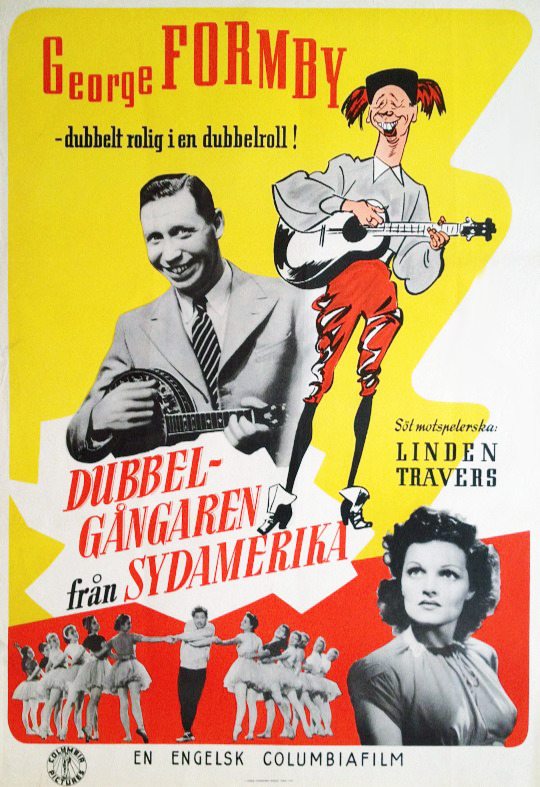
South American George (1941) review: South American George was George Formby’s first Columbia production and is a rather significant departure from much of his previous work. He’s still recognisable as the gormless, ukelele-strumming naïf, but there are some definite differences.
Notably, Formby plays a dual role—or, one might argue—actually two-and-a-half roles. Would-be performer George (George Formby) impersonates opera singer Gilli Vanetti (also Formby), who has broken his contract by leaving the UK (for Las Palmas in the Canary Islands). George does this to please Carole (Linden Travers), Gilli’s assistant, and (very peripherally) to obtain money for the retirement home where his aunt lives. Carole urgently wires Gilli to return to London, but in the meantime George is at the mercy of impresario Ricardo, who wants to break the unpopular singer’s contract. “Gilli” (George) is compelled to perform “any task” he’s ordered to take, including sweeping up the theatre and changing the letters on the marquee. Ricardo even sends two gangsters to incapacitate “Gilli,” then changes his mind when he sells Gilli’s contract to a “leg show” producer.
There is a very minor bit of back-story: George idolises his aunt, a former music-hall star, but his father insists George get a “real job.” George presumably has a burning desire to go on the stage himself, but his character is never actually portrayed as a serious striver after a performing career.
Formby thus plays George, Gilli, and George-impersonating-Gilli. This is not quite as strenuous as it might first appear: Gilli appears only briefly at the beginning and end of the film, and George’s impersonation of Gilli—although it takes up a significant percentage of the running time--only occasionally requires him to really fool anyone (he doesn’t even try to imitate Gilli’s voice—the script is contrived so George-as-Gilli is either suffering from laryngitis or is “saving his voice” for his performances), other than curling his hair and wearing a stick-on moustache.
The film’s title is extremely misleading. The film is not set in South America, and does not feature any “South American” characters (or even any notably Latin American-themed musical numbers). Opera singer Gilli Vanetti is clearly intended to be Italian, but presumably that would've been politically incorrect, even though the film is not overtly set in wartime (there are no men in uniform shown, no references to any restrictions on travel, etc.). As “enemy aliens,” Italians were subject to internment in WWII Britain, and so there's a VERY vague reference to Gilli being "popular in South America" (which doesn't actually specify his nationality). He has an indeterminate "foreign" accent.
The only actual war reference is one shot of a newspaper front page: 3 of the 4 articles are war-relevant (the 4th article is the fake one created for the film, about George Formby's character).
a) a headline reads "Airacobra Pilots Say it Beats the Spitfire"
b) partially-seen article on the left references "Tokio," "Washington," and "Cordell" [Hull]. Date of the newspaper is 31 Oct 1941, so this most likely is an article about talks between USA & Japan, pre-Pearl Harbor.
c) partially-seen article at the right references "evacuees" and "Soviet."
There are a few entertaining moments. In one scene, George hears a voice (his own, in voice-over)--
George: Who are you?
Voice: I’m Jiminy Cricket!
George: Never heard of you.
Voice: Well, you should go to the pictures more often. I’m your conscience.
[This reference to Walt Disney’s Pinocchio occurs several more times, but is not a major part of the film.]
George Formby had a reputation as a performer of “naughty” material—notably his double-entendre songs, but in other aspects of his films as well—and there are three mildly risqué bits in South American George.
First, as noted, above, George is compelled by the terms of Gilli’s contract to do “whatever the stage manager orders.” In one scene he’s on a scaffold, assigned to change the theatre marquee to read “Enrico Ricardo Presents A Season of Russian Ballet.” However, George discovers he’s missing a letter—so that the marquee reads “Enrico Ricard Resents A Season of Russian Ballet”—and drops a note to his assistant on the ground (George is pretending to have laryngitis so he won’t give himself away). The assistant reads the note and starts to lower the scaffolding, but George gestures “No,” and signals that he needs the letter “P.” The joke here is that the note apparently (it isn’t shown) reads “I need a P,” and the assistant thought George had to urinate!
Ricardo, trying to void Gilli’s contract on its “morality” clause, sends a blonde actress to his apartment, where Gilli will then be caught in a compromising situation. George-as-Gilli discovers the lingerie-clad woman—first shown in a fairly revealing shot—but with Carole’s help avoids being caught out.
Finally, George, in his Gilli disguise, is kissed by Gilli’s girlfriend Frances, and his stick-on moustache transfers to her upper lip. He removes it and tosses it aside. Then, as he’s leaving the room, he asks her to get up: “You’re sitting on me moustache. Huh! It’s a good job I still haven’t got it on!” (i.e., she’d be sitting on his face!)
South American George’s conclusion is protracted and awkward. The real Gilli returns to London, but “his” show has already begun. George has to impersonate him on stage, lip-syncing to recordings. Ricardo’s two gangsters show up, there’s a lot of farcical to-and-froing, George’s aunt and her retired performer pals do one number, and finally all is resolved, after a fashion. George and Carole profess their mutual affection, and George’s father (in the audience) grudgingly admits his son has talent.
South American George largely wastes the comic potential in two George Formbys, and there aren’t many memorable sequences in the running time (George’s first musical number, “The Barmaid at the Rose & Crown,” is actually rather good, especially since the real barmaid is extremely irritated by his singing and the rude lyrics).
0 notes